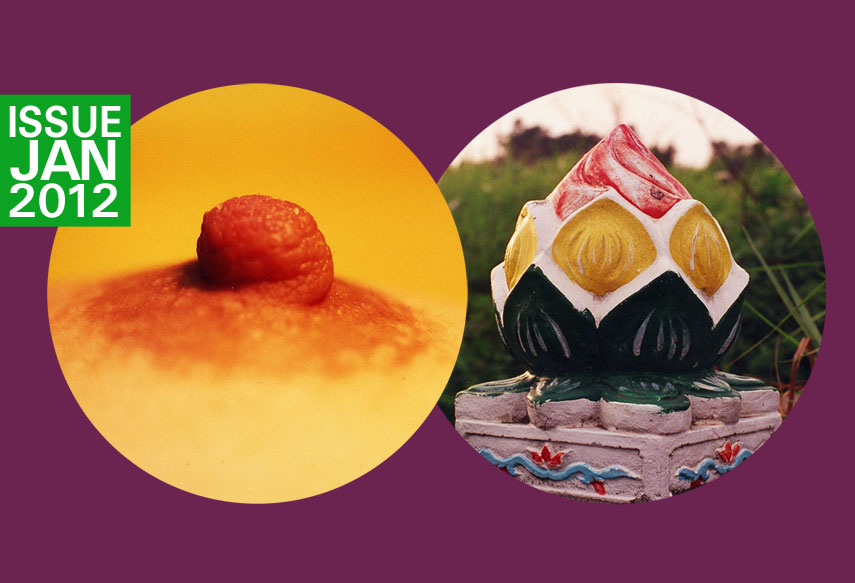- Featuring
- Wu He
- David Shields
- Bruno Jasienski
- Jonas Hassen Khemiri
- Legend Hou Chun-Ming
- Xi Chuan and Ouyang Jianghe
Have you heard that story about the German diplomat who could speak 65 languages? Drinking tea with the Empress of China, shirking his duties to learn Armenian in nine weeks, and perhaps most importantly, being able to say "kiss my ass" in 40 different languages—our jealousy was inflamed, for sure! At Asymptote, we cannot yet boast of being hyperpolyglots like Krebs; but with writing from 42 languages now in our pages, we can at least claim to be distinguished polyglots—wouldn't you agree?
Our fifth issue celebrates Asymptote's first anniversary with many other firsts: an extensive Special Feature on Taiwanese literature; a brand new essay by David Shields; a darkly humorous excerpt from a newly translated novel by Bohumil Hrabal; translated poetry from the endangered Ahtna Athabaskan language of interior Alaska; a mind-blowing spoken word performance by avant-gardist Hsia Yü, and the first ever English rendering of Bruno Jasienski's murderous novel I Burn Paris.
Our nets cast wide, our boat has filled with authors as diversely rich as Chu T'ien-wen (director Hou Hsiao-hsien's acclaimed screenwriter) and Hsia Yü (whose exclusive recording you should definitely not miss). We present pioneering fictioneers Wu He and Li Ang alongside two of the most exciting 40-under literateurs: Jing Xianghai and Egoyan Zheng.
Antonio Chen's comprehensive survey of the past year in Taiwanese novels presents further evidence of a literature worthy of international attention. Next to the contemporary work, we are proud to feature an excerpt from Auvini Kadresengan's ethnographic novel on the experiences of Taiwan's Indigenous peoples, a Japanese colonial-era piece written in Japanese by Zhang Wenhuan, and a short story by Chi Ta-wei about gay Taiwan at the height of the AIDS crisis, which comes with an update on LGBT issues 14 years later.
Illustrated throughout by legendary Taiwanese artist Hou Chun-Ming, this issue debuts our redesigned Visual section: new fullscreen slideshows enable immersive views of our guest artist's images of Hell and even a graphic short story by Judith Huang and Huang Zhipeng—a fascinating take on traditional Chinese painting and calligraphy, reworking Cultural Revolution-era author Hao Ran.
Words, however, remain our core business. Our Poetry section features new translations of twelve poets writing in, for example, Icelandic (Jón Thoroddsen), French (José-Flore Tappy), Persian (Hafez) and Chinese (two of the most important contemporary poets in China today: Xi Chuan and Ouyang Jianghe—the latter paired with essays by translator Austin Woerner and renowned sinologist Wolfgang Kubin.)
Over in Drama, we're thrilled to have snagged an excerpt from Jonas Hassen Khemiri's Obie Award-winning play about a chameleonic figure known only as Abulkasem. Our Interview section offers an important conversation about translation and Indonesian politics with Max Lane, the acclaimed translator of Pramoedya Ananta Toer.
In translation, everything comes with a little extra: browse our sidebar for links to original texts, translators' notes and audio recordings. If you hover your mouse above purple text, you might find a footnote or two. As always, we aim to offer as many paths of discovery as we can. And, as always, we need your support: consider donating to our not-for-profit organisation. Every bit of currency counts.
Do also send us your translations as well as new work. Our Special Feature section in April 2012 calls for original English-language fiction centering on "the unsaid."
In closing, we couldn't have dreamt of starting 2012 off in greater or more polyglotted (-glottive?) company. We hope you will join us, whether as reader or contributor, fan or follower on our various social media. We have for the happy occasion of our first anniversary just revamped our Tumblr blog—do visit us there for your daily fix of Asymptote goodness!
—Lee Yew Leong, Editor-in-Chief
Editorial Team for Issue Jan 2012
Founding Editor:
Lee Yew Leong (Taiwan/Singapore)
Managing Editor:
Florian Duijsens (Holland/Germany)
Section Editors:
Lee Yew Leong (Taiwan/Singapore)
Aditi Machado (India/USA)
Caridad Svich (USA/UK)
Sayuri Okamoto (Japan/Italy)
Nazry Bahrawi (Singapore/UK)
Contributing Editors:
Aamer Hussein (Pakistan/UK), Anthony Luebbert (USA) and Sim Yee Chiang (Singapore/Japan)
Masthead for Issue Jan 2012
Fiction/Nonfiction/Criticism/Feature: Lee Yew Leong
Poetry: Aditi Machado
Drama: Caridad Svich
Visual: Lee Yew Leong and Sayuri Okamoto
Interview: Nazry Bahrawi
Photo Illustrations and Cover: Legend Hou Chun-Ming
Guest Artist Liaison: Lee Yew Leong
Design: Lee Yew Leong and fFurious
Legal Counsel: Lindy Poh
Intern: Emma Jacobs
Asymptote would like to acknowledge the support and/or contributions of: Balkenende Chew & Chia (Advocates & Solicitors), Sidney Wade, Howard Goldblatt, Sylvia Lin, 黄崇凯, Rachel Hui-Yu Tang, Chia-En Jao, Chen Kaiyin, Sara Lin, 鯨向海, Huang Yin-Nan, Cheng Wen-chi, 林秀梅, 小波,Deanne Tan, Kevin Kunstadt, David Silverman, Steven Bradbury, Martin Riker, Yvonne Koh, Jason Brooks, Jim Freed, Tan Bee Thiam, Guo Bingxiu, Yvon Kao, Florin Bican, Francesca Spedalieri, Michael Lee, Joshua Lim, Hugo Muecke, Cheryl Reyes, Darryl Sterk, Gray Tan, Jeffrey Waxman, Karel Caals, Alvin Pang, Jo Yu-yuan Chang, Merv Espina, Tsuneo Murayama (Shinjuku Shobo), Jee Leong Koh, Judith Sollosy, Katharina Laszlo and Sara Noor.
Thanks go too to Paco Mitchell, Stephen Muecke and Tan Bee Thiam for their generous donations.

